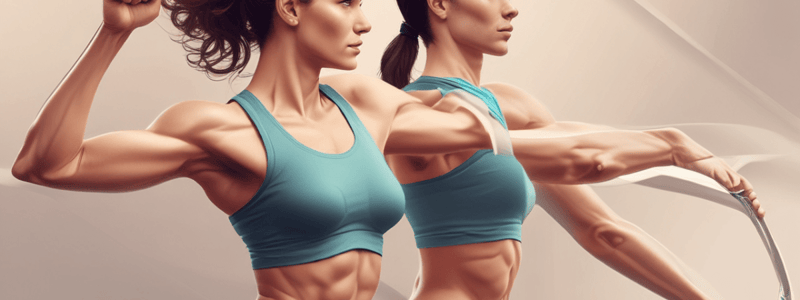Podcast
Questions and Answers
How is physical activity different from exercise?
How is physical activity different from exercise?
- Physical activity includes planned activities only.
- Exercise is a subset of physical activity with a structured aim. (correct)
- Exercise is done without a specific goal in mind.
- Physical activity does not benefit mental health.
What effect does physical activity have on body composition?
What effect does physical activity have on body composition?
- It increases fat mass.
- It decreases muscle mass.
- It can help reduce fat mass and increase or maintain muscle mass. (correct)
- It has no effect on body composition.
What is one example of a physical activity that requires flexibility?
What is one example of a physical activity that requires flexibility?
- Yoga (correct)
- Cycling
- Running
- Weightlifting
Which of the following describes aerobic endurance?
Which of the following describes aerobic endurance?
Which skill-related component of fitness is crucial for playing soccer?
Which skill-related component of fitness is crucial for playing soccer?
Which component of fitness does aerobic endurance primarily emphasize?
Which component of fitness does aerobic endurance primarily emphasize?
What is a common factor that affects physical fitness in different people?
What is a common factor that affects physical fitness in different people?
Which of the following is a benefit of physical activity to mental health?
Which of the following is a benefit of physical activity to mental health?
What physical activity benefit helps improve social health?
What physical activity benefit helps improve social health?
Which physical activity can help in reducing symptoms of anxiety?
Which physical activity can help in reducing symptoms of anxiety?
Flashcards are hidden until you start studying
Study Notes
Understanding Physical Activity and Fitness
- Physical activity is any action that uses energy, such as traveling between classes, swimming, biking, carrying groceries, dancing, playing sports, and lifting weights.
- Many people think exercise is the same as physical activity, but they are not exactly the same.
Benefits of Physical Activity
- Improved:
- Mental health, mood, and ability to cope with stress
- Academic performance and behavior
- Strength of muscles and bones
- Length of telomeres
- Sleep quality
- Immune system
- Social interactions and support
- Decreased risk of:
- Cancers (colon, lung, uterus, and breast)
- Type 2 diabetes mellitus
- Overweight and obesity
- Cardiovascular diseases (heart attack, stroke)
- Depression and anxiety
Lower Risk of Disease
- Regular physical activity lowers the risk of certain diseases, including cardiovascular diseases, cancer, and type 2 diabetes mellitus.
- Moderate amounts of physical activity can benefit the cardiovascular system, including a stronger heart, lower blood pressure, and lower blood cholesterol levels.
Cardiovascular System
- The cardiovascular system uses blood to carry oxygen throughout the body.
- Physical activity strengthens the heart and lungs, improving the body's ability to carry oxygen.
Better Weight Management
- Physical activity helps people reach and maintain a healthy weight by burning calories and building lean body mass.
- Regular physical activity can help prevent weight gain, muscle loss, and reduce the risk of many health problems.
Stronger Bones and Muscles
- Physical activity strengthens bones and muscles, improving joint health and reducing the risk of injury.
- Regular physical activity can improve muscle mass and strength, reducing the likelihood of falls and improving overall health.
High-Quality Sleep
- Physical activity improves sleep quality, helping people fall asleep faster, sleep more soundly, and wake up less often during the night.
- Regular physical activity can improve concentration, energy, and mental and emotional health.
Improved Mental, Emotional, and Social Health
- Physical activity has benefits for mental and emotional health, including reducing stress, anxiety, and depression.
- Physical activity can improve social health by increasing opportunities for social interaction and building stronger relationships.
Physical Fitness
- Physical fitness refers to the body's ability to perform daily activities with ease and vigor.
- There are two types of physical fitness: health-related fitness and skill-related fitness.
Health-Related Fitness
- Health-related fitness is the type of physical fitness needed to perform daily activities with ease and energy.
- Components of health-related fitness include aerobic fitness, muscular strength, muscular endurance, body composition, and flexibility.
Cardiorespiratory Fitness
- Cardiorespiratory fitness refers to the body's ability to deliver oxygen and nutrients to muscles and cells.
- Benefits of cardiorespiratory fitness include a strong heart, improved blood flow, and quick transport of oxygen and nutrients to muscles and cells.
Skill-Related Fitness
- Skill-related fitness involves the components of fitness needed to perform successfully in a particular sport or leisure activity.
- Components of skill-related fitness include speed, agility, balance, power, coordination, and reaction time.
Studying That Suits You
Use AI to generate personalized quizzes and flashcards to suit your learning preferences.




